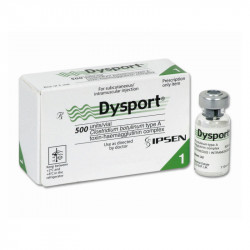

Dysport contains the substance called botulinum toxin type A as its active ingredient. Inactive ingredients of Dysport include human albumin, lactose and protein from cow’s milk.
Dysport was originally developed for the treatment of neurological and ophthalmic conditions in the early 1990s in the United Kingdom and has established clinical success. Patients with excessive sweating under the armpits (axillary hyperhidrosis) are also treated with this product.
Pharmacological Action
Dysport contains substance called botulinum toxin type A that relaxes the muscle. Botulinum toxin is derived from Clostridium botulinum bacteria that intercept the discharge of acetylcholine from the nerve endings that causes the contraction of muscles.
For the improvement of the appearance of glabellar lines, Dysport temporarily impede the tightening of muscles found between the eyebrows for about 4 months.
For the treatment of abnormal head position and neck pain caused by cervical dystonia (CD), Dysport lessens the muscle spasm that causes the CD by softening the muscle for about 12 to 16 weeks. Neck pain and abnormal head position as symptoms to CD is thereby reduced.
Dysport works in two functions, which is by inhibiting the release of acetylcholine and at the same time blocks the neuromuscular activity.
Dysport Indication
Dysport is indicated for the treatment of the following conditions specifically indicated in the medication guide:
Abnormal head position (spasmodic torticolitis) and neck pain brought about by the condition called cervical dystonia (CD) in adults,
Temporary improve the appearance of moderate to severe frown lines found between the eyebrows (glabellar lines) in patients younger than 65 years old.
Dysport 500IU is also prescribed for the medication of the following condition:
Arm spasticity (stiffness in the arm muscles) that occurs following a stroke.
Equinus foot deformity (abnormal ankle position and walking gait) caused by cerebral palsy spasticity in children 2 years old or older.
Blepharospasm (a condition affecting the eyelid). This condition losses the persons’ control on the blinking and closure of his eyelids.
Hemifacial spasm (a condition affecting the face muscle). Persons’ affected with this condition losses control on his face muscle, enabling it to contract without control.
Mode of Administration
Dysport is administered through intramuscular injection on the affected muscles. It should be performed by a health care provider who is trained and has the skill of identifying the essential attributes of muscles.
For the treatment of cervical Dystonia: Dysport is administered with the initial divided dose of Dysport 500IU? given through intramuscular injection in affected muscles. Depending upon the result of treatment and patient’s response to medication, Dysport may be administered every 12-16 weeks or as prescribed by Doctor with a dosage between 250 to 1000 units.
For the improvement of Glabellar lines: Dysport is administered intramuscularly in the affected muscles not exceeding the total dose of 50 Units, divided in 10 aliquot units or for 5 equal dosages.
Intervals or frequency for re-treatment must not transpire less than 3 months (12 weeks) following the previous injection or administration.
Contraindications and Cautions
Dysport is contraindicated to persons who have an allergic reaction to any Dysport ingredients. It is important to inform your Doctor if you have either an infection on the possible site for injection or are allergic to the following substance:
Protein from cow’s milk
Botulinum toxin such as Botox or Myobloc
Persons who have the following symptoms or conditions are advised to tell your Doctor of your concern and the possible effect of Dysport on your current condition:
Asthma or Emphysema
Abnormal sugar level or Diabetes
Bleeding problems
Irregular heartbeat
Dysport and Breastfeeding. It is not known whether Dysport passes in to breast milk. It is however important to inform your Doctor if you are breast feeding a baby to avoid harm to the nursing infant.
Dysport and Pregnancy. FDA classified Dysport under the C category for pregnancy. Dysport should be used with caution on pregnant women, as such; benefits should exceed the risk that is involved in the use of this medication.
Dysport may cause muscle weakness and must not be taken by persons who are operating machinery or driving a vehicle.
Dysport is generally not recommended to patients under 18 years old.
Dysport Side Effects
Like any medication, side effects may occur on the use of this medication. The side effect that is associated on the use of Dysport varies from moderate to serious classification.
Moderate or less serious side effects: The following side effects will diminish after couple of hours:
Discomfort and pain at the injection site
Headache
Tired feeling
Muscle pain
Neck pain
Mild allergic reaction such as itching, rash, dizziness and faint
Dropping eyelids
Blurred vision
Serious side effects: Immediately seek medical intervention if any of the following side effects occurs. Spread of toxin may cause serious side effects in the area outside the injection site and is usually accompanied by the following symptoms:
Dysphonia (change or loss of voice or the occurrence of hoarse voice )
Dysarthria ( trouble speaking a word clearly)
Breathing trouble
Swallowing problem
Severe wheezing and asthma symptoms
Loss of bladder control
It is important to inform your doctor right away if you have any discomfort or unnatural occurrence in your present condition.
Drug Interactions
Drug interactions will normally affect the efficacy of the treatment. There is no solid study that is conducted on the possible interaction of Dysport to certain medication.
The following treatment that interferes with neuromuscular transmission may affect the efficacy of Dysport:
Aminoglycosides (curare-like agents)
Anticholinergic drugs
Other Botulinum Neurotoxins
It is however important to inform your medical practitioner of any medication you are currently taking for him to have a complete assessment of its possible interaction with Dysport.
-
Protein Based Therapies
-
No
-
No
-
No
-
No
-
No
Add a Review
Your email address will not be published. Required fields are marked *
Submit a Photo
Your email address will not be published. Required fields are marked *




